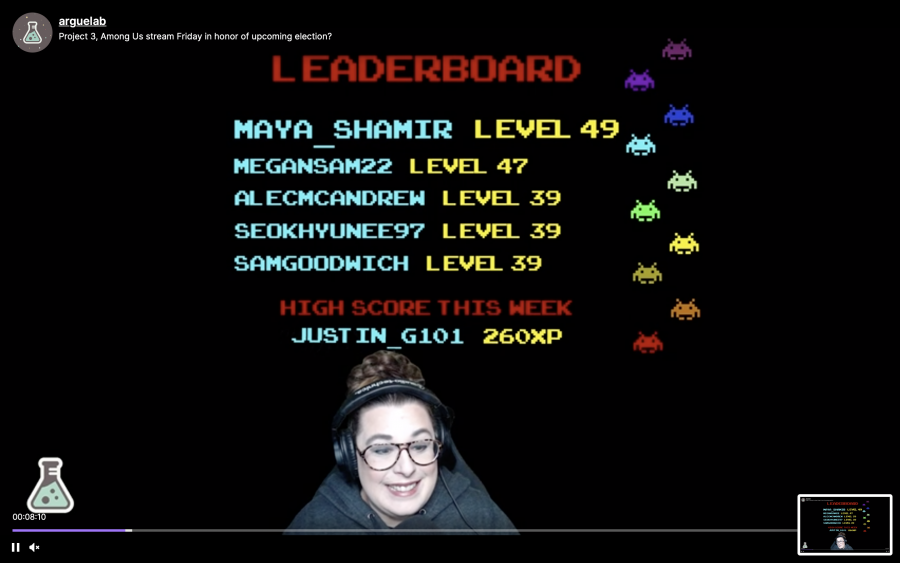There’s no Zoom fatigue in Rhetoric and Writing 306, just 20 or so students vying for the top of the leaderboard.
That’s because the class isn’t just a class — it’s a video game designed by rhetoric and writing Ph.D. candidate Amy Tuttle-Charron. She livestreams weekly on the streaming platform Twitch instead of hosting Zoom lectures. Students must earn enough points by the end of the semester to achieve their target grade in the class.
Students have four major assignments, each worth 25 levels. They also have the option to complete extra credit “grind” work every week that earns them XP points and can help them level up. There is a wide range of possibilities for grind work, from organizing sources for an upcoming paper to reading poetry to voting.
Tuttle-Charron hosts lectures on Twitch, and students use Discord to set up peer reviews. Twitch and Discord are platforms that video game players often use to watch others play, communicate and play together.
Tuttle-Charron said she designed the class to help incoming freshmen adjust to the pace of college.
“I wanted to strike the balance between the feedback loop of encouragement and nurturing,” Tuttle-Charron said. “Students are free to fail and try things.”
Architecture junior Maya Shamir was at the top of the leaderboard the week of Halloween.
“Depending on how everyone’s week is, the amount of work they do varies a lot week by week,” Shamir said. “This is for sure true for me.”
Tuttle-Charron said her main philosophy for the class is putting responsibility back into the students’ hands.
“When you’re a freshman in college, you’re an adult, but you’re a brand-new adult,” Tuttle-Charron said. “You need to learn to make choices and deal with the consequences of those choices on your own.”
Sometimes students who aren’t in the course log on to the Twitch livestream, Tuttle-Charron said.
“One of my students who is enrolled in the class told their friend who’s still in high school about this course, and they are (now) a regular in the stream,” Tuttle-Charron said. “I thought that was kind of cool.”
Classical studies freshman Megan Hunter said she was overwhelmed when the semester began, but Tuttle-Charron’s class structure taught her how to manage her workload.
“For some of my other classes, you don’t have to do much, but (I’ve learned) the more you put in the more you get out of it,” Hunter said.
Tuttle-Charron said she has played Pokémon her whole life and used that experience as inspiration for the class design. When she got stuck on a hard level in the video game, she kept trying until she could overcome it.
“What the video games would teach me to do was to keep practicing,” Tuttle-Charron said. “I kind of figured that the video game lesson is that actual struggle, the ‘grind,’ (or) what I call the work in my class.”
Although Akksay Singh, a chemistry and computational engineering senior, said the class format is a little bit harder for him compared to the traditional Zoom format, it also encourages him to communicate with fellow students.
“It’s much different than other classes, and it’s more relatable,” Singh said.
Tuttle-Charron said she hopes other professors will consider adopting a unique format for online classes.
“I love in-person school, and I love learning,” Tuttle-Charron said. “But there’s something cool for both students and for us as teachers about thinking about different ways to deliver this content.”





















